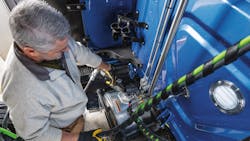Fleet sustainability begins before moving to zero-emissions
“Sustainable fleets start before changing fuel.” That is a quote from Geotab’s Charlotte Argue made during a recent webinar.
I love her quote; it speaks to what we at NACFE stand for. While we do see zero-emission goods movement as the future of trucking, we know it is a process that will take time, and in our 11 years of existence, we have focused most of our attention on improving the freight efficiency of diesel-powered vehicles.
The work we do has helped fleets make decisions about aerodynamic devices for both tractors and trailers, idle reduction technologies, tires, tire monitoring systems, axle configurations, transmissions, lightweighting, and downspeeding.
I think the point of Argue’s statement is that if fleet managers want to operate in a more sustainable manner, there are things they can be doing today to their existing vehicles to optimize their freight efficiency. Some of those things cost money—investing in chassis fairings, battery HVAC systems, or solar panels, to name a few technologies. Some of those things are free—optimizing routing, setting engine parameters, and training drivers to drive in a more fuel-efficient manner.
See also: Finding the efficiency sweet spot in trucking
Being a sustainable fleet is a mindset in which decisions a fleet makes about its operations is viewed through the lens of increasing freight efficiency, of course, keeping in mind total cost of operation. And many of your shipper companies are asking you how you are moving freight more sustainably. One part of your answer should be, “We are moving your goods with less fuel, creating less emissions.” That is a very strong sustainable action!
It also means taking the fuel-efficiency lessons learned with diesel-powered vehicles and carrying them over to any battery-electric vehicles the fleet may purchase. Many of the same technologies that make diesel trucks more efficient also will make battery-electric vehicles more efficient.
So as fleets begin their electrification journey, I hope they will keep Argue’s statement in mind because she’s right. Being sustainable starts way before you make the first step toward an electric future.
Michael Roeth has worked in the commercial vehicle industry for nearly 30 years, most recently as executive director of the North American Council for Freight Efficiency. He serves on the second National Academy of Sciences Committee on Technologies and Approaches for Reducing the Fuel Consumption of Medium and Heavy-Duty Vehicles and has held various positions in engineering, quality, sales, and plant management with Navistar and Behr/Cummins.
About the Author

Michael Roeth
Executive Director
Michael Roeth is the executive director of the North American Council for Freight Efficiency. He serves on the second National Academy of Sciences Committee on Technologies and Approaches for Reducing the Fuel Consumption of Medium and Heavy-Duty Vehicles and has held various positions with Navistar and Behr/Cummins.
